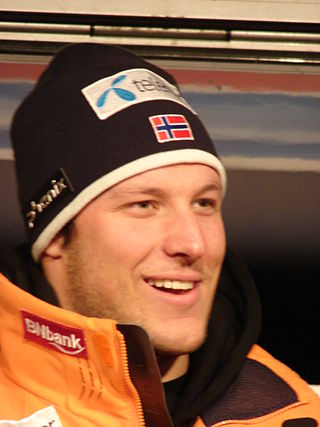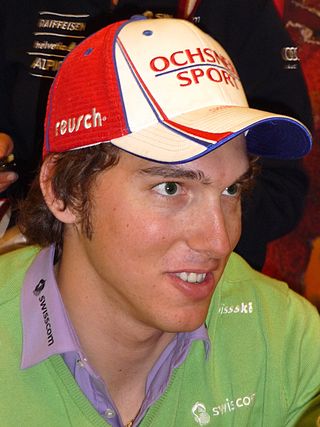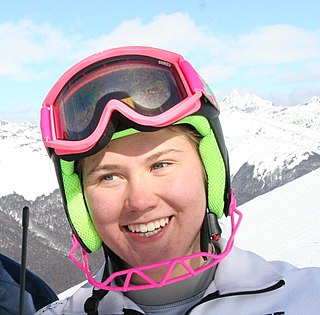
The FIS Alpine Ski World Cup is the top international circuit of alpine skiing competitions, launched in 1966 by a group of ski racing friends and experts which included French journalist Serge Lang and the alpine ski team directors from France and the USA. It was soon backed by International Ski Federation president Marc Hodler during the FIS Alpine World Ski Championships 1966 at Portillo, Chile, and became an official FIS event in the spring of 1967 after the FIS Congress at Beirut, Lebanon.

Luc Alphand is a former World Cup alpine ski racer from France. He specialized in the speed events and later became a race car driver.
The 39th World Cup season began in October 2004 in Sölden, Austria, and concluded in March 2005 at the World Cup finals in Lenzerheide, Switzerland. The overall winners were Bode Miller of the U.S. and Anja Pärson of Sweden.
The 35th World Cup season began in October 2000 in Sölden, Austria, and concluded in March 2001 at the World Cup finals at Åre, Sweden. The overall winners were Hermann Maier of Austria, his third, and Janica Kostelić of Croatia, her first. Maier won 13 races and had nearly twice the points of his nearest competitor, compatriot Stephan Eberharter. In the women's competition, Kostelić won nine races and won the overall by 67 points over Renate Götschl of Austria. There were no North Americans in the top ten of either competition.
The 33rd World Cup season began in October 1998 in Sölden, Austria, and concluded in March 1999 at the World Cup finals at Sierra Nevada, Spain. The overall winners were Lasse Kjus of Norway, his second, and Alexandra Meissnitzer of Austria, her first.
The 32nd World Cup season began in October 1997 in Tignes, France, and concluded in March 1998 at the World Cup Finals in Crans-Montana, Switzerland. The overall winners were Hermann Maier of Austria, his first, and Katja Seizinger of Germany, her second.
The 30th World Cup season began in November 1995 in Tignes, France, and concluded in March 1996 at the World Cup finals in Lillehammer, Norway. The overall champions were Lasse Kjus of Norway and Katja Seizinger of Germany, the first of two overall titles for both.
The 29th World Cup season began in November 1994 in Park City, USA, and concluded in March 1995 at the World Cup finals in Bormio, Italy. The overall champions were Alberto Tomba of Italy and Vreni Schneider of Switzerland.
The 27th World Cup season began in November 1992 in Sestriere, Italy for men and Park City, Utah, USA for women, and concluded in March 1993 at the newly created World Cup Final in Åre, Sweden. A break in the schedule was for the 1993 World Championships, held in Morioka, Japan, from February 4–14.
The 25th World Cup season began in August 1990 in New Zealand, resumed in December, and concluded in March 1991 in the United States. The overall winners were Marc Girardelli of Luxembourg, his fourth title and Petra Kronberger of Austria. This was the first season following the reunification of Germany and the last before the dissolution of Yugoslavia.
The 16th World Cup season began in December 1981 in France and concluded in March 1982, also in France. Phil Mahre of the US repeated as overall champion, the second of his three consecutive titles. Erika Hess of Switzerland won the women's overall title.
The 10th World Cup season began in December 1975 in France and concluded in March 1976 in Canada. Ingemar Stenmark of Sweden won the first of his three consecutive overall titles. Defending women's overall champion Annemarie Moser-Pröll, who had won five straight overall titles, missed the entire season so that she could care for her father, who was terminally ill with lung cancer. In her absence, Rosi Mittermaier of West Germany, a double gold medalist at the 1976 Winter Olympics, won the women's overall title.
The 8th World Cup season began in December 1973 and concluded in March 1974. Piero Gros of Italy won the overall title, denying the runner-up, countryman Gustav Thöni, a fourth straight overall title. Annemarie Pröll of Austria won the women's overall title, her fourth of five consecutive.
The 1st World Cup races began in early January in West Germany and concluded in late March in the United States. Jean-Claude Killy of France dominated the men's competition, winning each of the three disciplines and the overall title. Nancy Greene of Canada edged out Marielle Goitschel of France for the women's overall title, her first of two consecutive titles, defending successfully in 1968.

The 43rd World Cup season began in late October 2008 in Sölden, Austria, and concluded in mid-March 2009, at the World Cup finals in Åre, Sweden.

The 44th World Cup season began on 24 October 2009, in Sölden, Austria, and concluded on 14 March 2010, at the World Cup finals in Garmisch, Germany.

The 47th World Cup season began on 27 October 2012, in Sölden, Austria, and concluded on 17 March 2013, at the World Cup finals in Lenzerheide, Switzerland. The overall titles were won by Marcel Hirscher of Austria and Tina Maze of Slovenia.

Estelle Erika Ainee Alphand is a French-born Swedish alpine skier, who competes in all events. She was born in Briançon, France, and she is the daughter of the former alpine skier and rally driver Luc Alphand. She has represented Sweden since the start of the 2018 season, having previously competed for France.

The women's downhill in the 2023 FIS Alpine Skiing World Cup consisted of nine events, including the final. The original schedule called for eleven events, but the first two races of the season scheduled for 5 and 6 November 2022 in Zermatt/Cervinia, were canceled due to adverse weather conditions; the FIS decided not to reschedule them. Once the season began, a downhill scheduled in St. Anton on 14 January had to be converted into a Super-G due to the inability to hold a pre-race training run on either of the two days prior to the downhill. However, a subsequent Super-G scheduled at Cortina d'Ampezzo was converted into a downhill, restoring the original schedule.

The men's downhill in the 2023 FIS Alpine Skiing World Cup consisted of ten events, including the final. The season had been planned with fourteen downhills, but early in the season, two scheduled downhills on 29/30 October 2022 on the Matterhorn, running from Switzerland (Zermatt) into Italy (Cervinia), were canceled due to lack of snow and not rescheduled. Later in the season, a downhill scheduled for Garmisch-Partenkirchen on 28 January 2023 was also cancelled for lack of snow and not rescheduled. Finally, on 3 March, a scheduled downhill at Aspen was canceled due to poor visibility and deteriorating weather conditions, even though 24 racers had already started. The first out of the starting gate, Norway's Adrian Smiseth Sejersted, held the lead and was hoping for six more competitors to start so that the race would become official, but the weather conditions prevented that.







